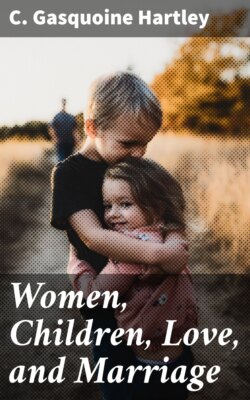Читать книгу Women, Children, Love, and Marriage - C. Gasquoine Hartley - Страница 8
На сайте Литреса книга снята с продажи.
I
ОглавлениеUnder this title the Danish writer, known as Karin Michaelis, in the far-back years before the war—a time now marked as the terrible period of the suffrage craze, gave to the world a remarkable and intimate revelation of a woman. It is perhaps the most illuminating work that has been written in recent years about women, from its rare quality of femininity, expressed with an unconscious sincerity and biting truth.
It is very late in the day to describe a book which, though now forgotten, was, at the time of its publication, very widely read and still more widely criticised and discussed in almost all European countries. It appeared at a time of great feminist unrest, which accounts, to some extent, for the reception it gained.
The story matters very little, for it is not as the confession of one woman that “The Dangerous Age” gains its importance, it is because it affords a diagnosis of an old and a very great evil, as well it is an acute observation of a certain type of woman’s soul or character.
It is from this aspect that I wish to approach it, and for this reason I have called it “A Tract for the Times.”
Thus it is of very little importance to my present purpose that the book is not a new one. It does not matter if the story is remembered, or indeed, if the book itself has, or has not, been read. If the reader will recall to his or her mind any one of the restless, unsatisfied women they must know—women, not young but not old, they will have the history (the variety in the details will not matter at all) of Elsie Lindtner, the heroine of this story.
This admirable piece of observation deals with a section of women who have come into being through our industrial civilisation with its wrong ideals and stupid customs. Marcel Prévost1 in his preface to the book, speaks of Elsie Lindtner’s confession as a revelation of the feminine soul of all time. With the latter part of this opinion I entirely disagree. Rather would I say that it is a revelation of the soul of woman as that soul has been evolved through the repression of natural instincts and the want of satisfying fields for the expression of energy, in an atmosphere which very surely gives birth to the modern demons of confused desires and unconscious unhappiness.
The title of the book is not, I think, well chosen. The Dangerous Age—Elsie Lindtner was forty-two when she wrote her confession—was dangerous because of the life which had preceeded it. There is, without doubt, a cleavage in life, which may be said to be marked by the diminishing of attraction towards the opposite sex. But this is common to men as well as to women. It belongs to no special age, and its proportion of danger to the individual rests, first on the fulness or poverty of experience before this period arrives, and secondly on the power to extract from the past the joyous impulse for continuous living. But to Elsie Lindtner, as to all women of such false and restricted experience, it was far more than a cleavage, and because she had never lived simply and completely, she experienced that emptiness which strikes the soul with death when the consciousness comes that the opportunities of life are passing.
The terror of approaching age robbed her of all her hope of future happiness, just because she had emptiness in her past.
It is easy to condemn her, to speak of her selfishness, her falseness, her colossal egoism—there are few adjectives of condemnation that I have not heard applied to the Elsie
Lindtner’s of life. Yet if we look at the matter rightly, rather ought we to admire her for the perfect self-sacrifice with which she pursued the one occupation.
